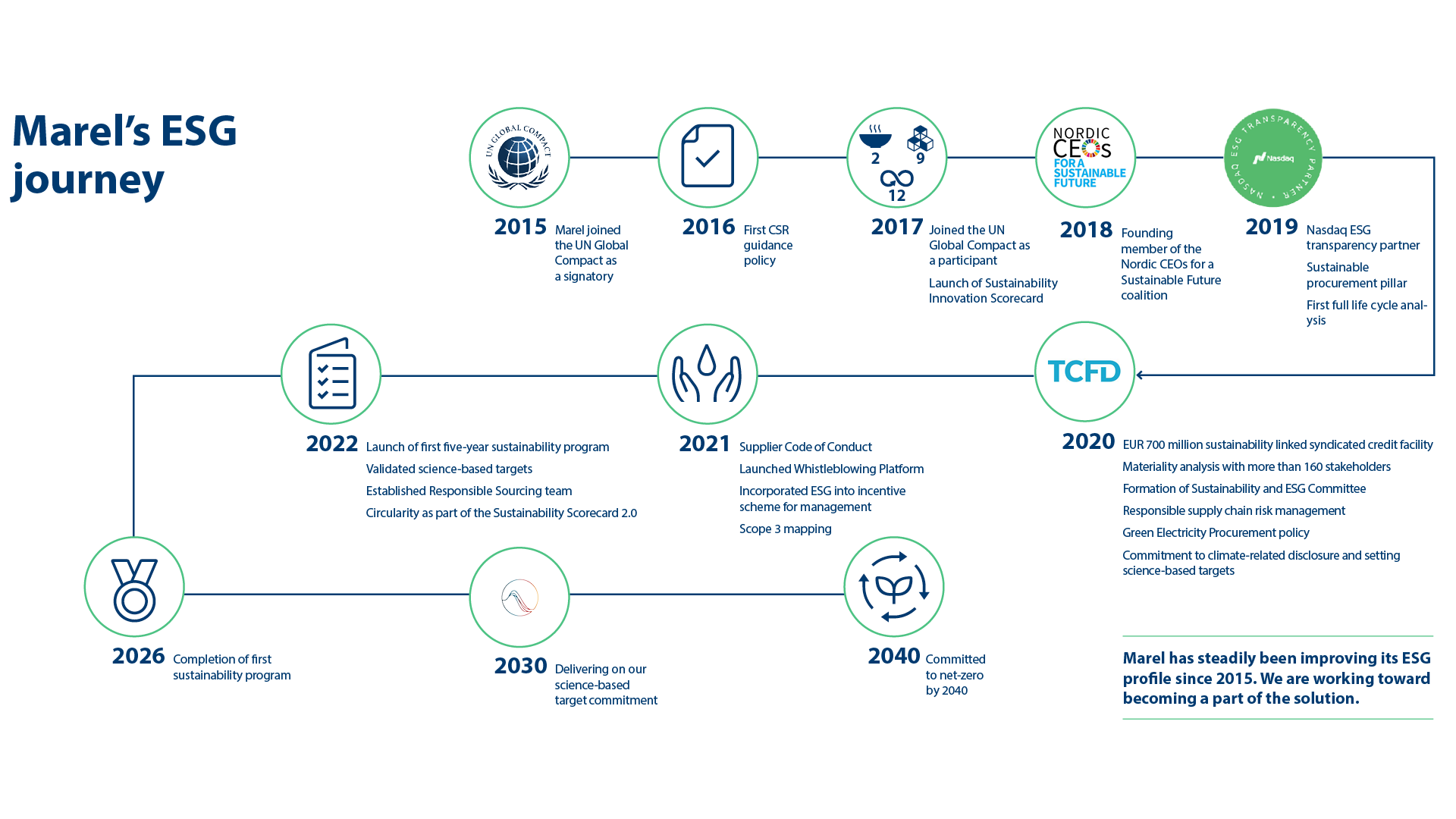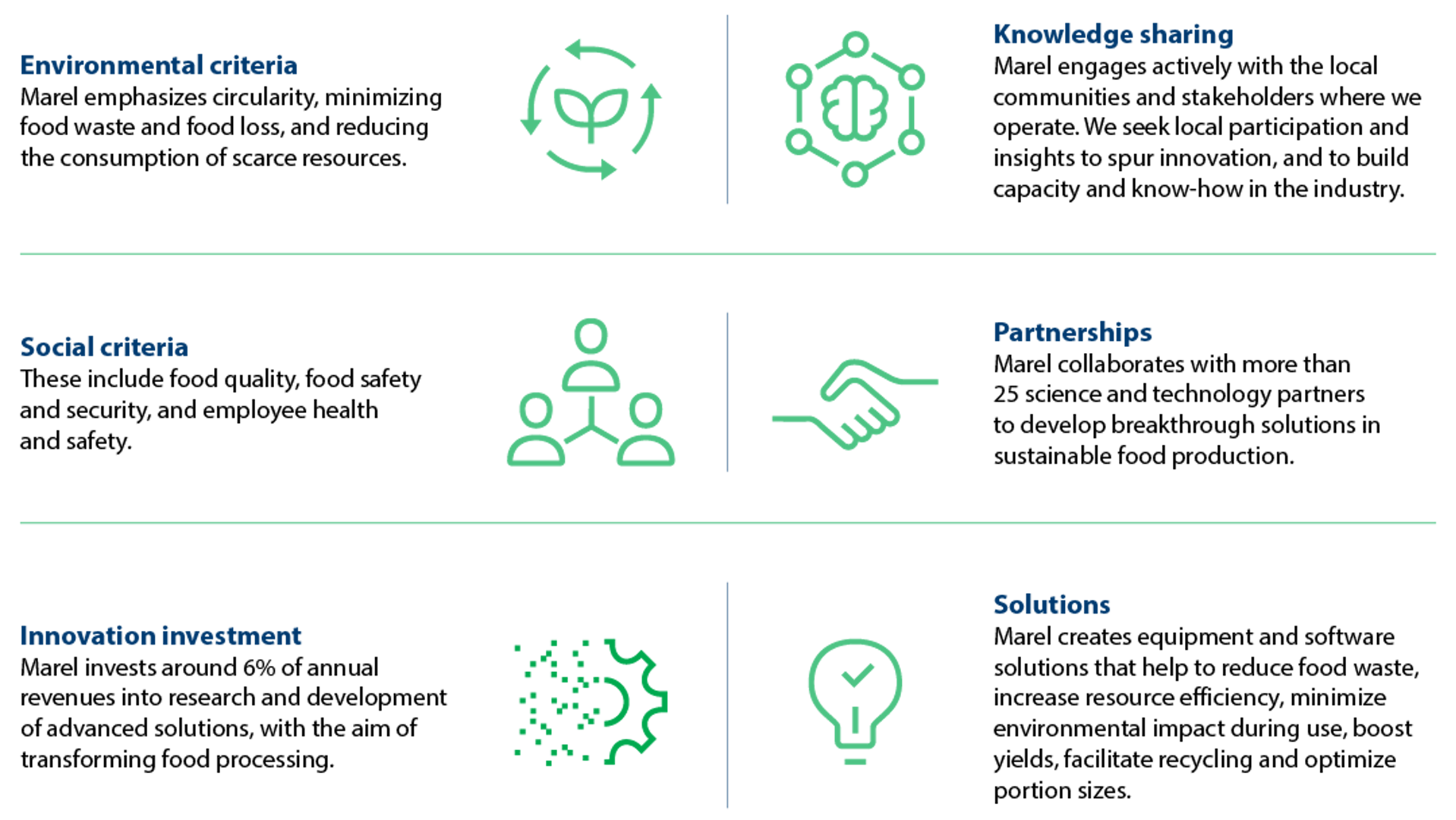Sustainability
We embrace our role as a critical infrastructure company in the global food industry. Environmental, social and governance (ESG) pledges and climate targets are shaping the futures of our stakeholders, driving the industry toward more sustainable and affordable production of highquality food. By taking bold steps to reduce emissions and committing to becoming net-zero by 2040, Marel aims to enable customers to deliver on their sustainability strategies.
In 2022, we made great progress in our sustainability efforts, particularly in the area of reporting. We took significant steps on our climate-related disclosure journey, implemented a more robust governance structure around sustainability issues, and our science-based emission targets were validated. We also updated our Sustainability Scorecard 2.0 to include circularity criteria for all new product development and announced our first mediumterm sustainability program, which is fully in line with Marel’s 2026 growth plan. Further, we expanded ESG criteria into the short-term incentive plans for around a quarter of our employees.
Responsible governance
Marel is committed to exercising sound corporate governance in line with corporate best practices and applicable legislation concerning public companies. We have a clear objective of embedding ESG criteria into all aspects of Marel’s governance, including business planning and operations. Our sustainability team drives ESG goal-setting efforts and disclosure. The team also monitors ESG compliance in collaboration with various business functions including Internal Audit, Supply Chain and Finance.
Framework, guidelines and principles
In 2022, the Sustainability and ESG Committee, which is a sub-committee of the Executive Board, was chaired by Marel’s Director of Sustainability and Community Engagement. Marel’s corporate governance framework includes our Articles of Association; Guidelines on Corporate Governance issued by the Iceland Chamber of Commerce, Nasdaq Iceland and the Confederation of Icelandic Employers; and the Dutch Corporate Governance Code.
Marel follows the Nasdaq ESG reporting guidelines and has been a Nasdaq ESG transparency partner since 2019. These guidelines are mostly aligned with the standards set forth by the Global Reporting Initiative (GRI), the UN Global Compact, the Task Force on Climate-Related Financial Disclosures and the Value Reporting Foundation Sustainability Accounting Standards Board.
We disclose our sustainability performance in line with the principles and definitions detailed in the explanatory note of Marel’s 2022 sustainability disclosure. We believe that this is the most accurate reflection of Marel’s sustainability performance possible until the global sustainability reporting landscape transitions toward homogenization of the various standards.
We are guided by three pillars of responsibility: social, environmental and economic. Each is equally important and guides our decision-making processes at all levels.

Marel’s ESG journey

Sustainability roadmap
Since the first days of Marel, we have made consistent progress in increasing our sustainability impact, with special emphasis on improving the company’s ESG profile since 2015. As we work to be a part of the solution, we are setting leading standards in the food processing industry for our customers, employees, shareholders, suppliers, strategic partners and consumers.
Our sustainability roadmap is designed in partnership with our customers, employees, suppliers, innovation partners and other key stakeholders. In 2020, we engaged with more than 160 stakeholders to gain insight and clarity regarding the most relevant sustainability topics for Marel.
Following the roadmap, we can direct our efforts toward raising sustainability performance by focusing on four key themes: transforming our industry, partnerships to deliver value, sustainable solutions and championing the fundamentals. In 2023, we plan to update the roadmap to ensure compliance with upcoming regulations on sustainability reporting disclosures.
Sustainability program
Marel is committed to becoming net-zero by 2040. To strengthen our long-term commitment, we launched a five-year sustainability program, running from 2022 until the end of 2026. It sets ambitious environmental, social and governance targets with the aim of guiding both Marel and the industry on a more sustainable path.
The program is fully in line with our 2026 growth strategy and complements our long-term climate ambitions. In 2022, we set science-based emissions reductions targets in line with the Paris Agreement, and these targets were validated by the Science-Based Targets initiative (SBTi) in the same year. We regularly review and update these targets. Going forward, we will increase the frequency of our ESG performance communication to a quarterly basis.


Contributing to the UN Sustainable Development Goals
Marel has been a signatory to the United Nations Global Compact since 2015 and a participant since 2017. Through this participation, we direct our efforts toward benefiting people, the planet and our operations by focusing on the following three UN Sustainable Development Goals (SDGs):

Benefitting our stakeholders through innovation
Innovation is the primary way we make an impact and meaningfully contribute toward the SDGs. Our actions are focused around:

Pioneering product development

Sustainability Scorecard 2.0
In 2017, Marel implemented a strict process framework with an accompanying scorecard to evaluate new products and to support the development of valuable and feasible technologies. Sustainability was a key consideration in this evaluation. In 2018, we integrated the scorecard into all new product development processes to help Marel’s innovation teams improve sustainability in the food value chain.
In September 2022, we updated the scorecard with enhanced circularity criteria for all new product development. Sustainability Scorecard 2.0 ensures that we are providing more innovative and sustainable products and solutions for our customers, which in turn supports them with their ESG ambitions.
Sustainability and circular design at every stage
The updated scorecard is now used throughout all phases of the product development process. This encourages continuous improvements on sustainability factors at every stage of the process.
Another major change is the addition of a new category—circular design—which prioritizes the circular use of materials through increased reuse, repair, refurbishment and remanufacture of products. The scoring criteria for circular design cover aspects such as circular material choices, modularity, upgradability, repairability and remote or condition-based maintenance.
Other categories in the scorecard cover food waste reduction, environmental impact, safety impact, animal wellbeing and other sustainable innovation.
In 2022, 100% (2021: 100%) of all innovation projects approved for further development were rated using the scorecard, beginning in the second stage, feasibility.
Life cycle analysis and product end-of-life
In 2022, we finalized a life cycle analysis (LCA) of our 10 core cross-industry solutions to assess their full carbon footprint from design through production until end-of-life. This analysis provides Marel’s innovation team with valuable insights to improve the environmental footprint of our solutions.
This process started in 2018, when we took our first steps toward understanding the full carbon footprint of our machinery during its lifetime. We began performing a meticulous study of a broad cross-section of our products, following internationally recognized methodologies to assess raw material extraction, manufacturing and processing, transportation, use-phase estimates as well as end-of-life, recycling and circularity.
Three key action points
The life cycle analysis identified three key actions that Marel can take to mitigate the environmental impact of our products:
1. Minimize energy and water consumption during the use-phase.
2. Ensure the durability and longevity of our products.
3. Reduce food processing waste.
Delivering carbon neutral solutions to our customers not only reduces emissions but also adds resilience to Marel’s offerings.
By performing life cycle analyses, Marel and customers gain valuable opportunities to align with the EU Taxonomy, a framework for sustainable investment.
Sustainable supply chain and procurement
We are working toward creating a sustainable supply chain for our manufacturing locations and our external supply base. Through our sizeable annual product-related procurement spend and several thousand suppliers in our supply chain globally, we can have a considerable positive impact.
To achieve this, we have a responsible supply chain program that focuses on energy, waste management, health and safety, and ethical and social conduct. This applies in all our manufacturing locations as well as in our partnerships with suppliers worldwide.
Collaboration with suppliers for a sustainable value chain
Sustainability is a key pillar of Marel’s procurement strategy. Our goal is to collaborate with suppliers across the entire value chain to proactively reduce the societal and environmental impacts of developing, producing and delivering our solutions and spare parts.
Supplier engagement and due diligence are key components of this effort, and in 2022 we strengthened these processes with the support of a dedicated responsible sourcing team. We expect our key suppliers and development partners to be EcoVadis rated and collaborate with us as needed to define improvements. As part of our science-based targets initiative, we monitor purchased goods emissions and explore options with best-in-class suppliers for reducing emissions in high-emitting purchasing categories such as stainless steel.
Knowledge sharing and communication
We believe that knowledge sharing and communication about supply chain sustainability are crucial. To support this, we have increased the information available for our suppliers through online channels and meetings. For example, we organized a supplier day at our Slovakia location, during which we shared our vision for future growth. In addition, we implemented a procurement academy in 2022 to develop the knowledge and skills of our staff.
Information- and cyber-security
Cyber resilience is vital for doing business in modern society, as evidenced by the major financial and operational impact of cyber-attacks worldwide. As a leader in driving digitalization in the food processing industry, Marel recognizes the importance of adhering to the highest standards of information- and cyber-security. We prioritize this security to protect the critical food supply chain and maintain the trust of our customers and partners.
Ethics and the Code of Conduct
To fulfill our day-to-day ethics and compliance responsibilities, we must be mindful of our commitments to each other, our customers, our business partners and the communities where we operate. In line with this, we published an updated version of the Marel Code of Conduct in 2022 to ensure that we remain a mindful and committed partner.
The Code of Conduct applies to all members of Marel’s extended global family, which includes consultants, suppliers, vendors, contractors and other business partners. Business partners serve as extensions of Marel and are expected to follow the spirit of our Code, as well as any contractual provisions while working on our behalf.
In addition, in 2022 we published a separate Supplier Code of Conduct, which procurement partners are required to sign and comply with.
Whistleblowing
Marel encourages employees to report any potential violation of laws, safety or ethics. We strictly prohibit any form of retaliation against anyone who makes a report in good faith, and we protect the anonymity of whistleblowers. An up-to-date policy and digital whistleblowing platform are available to all employees, enabling them to report any suspicious activities formally and anonymously.
